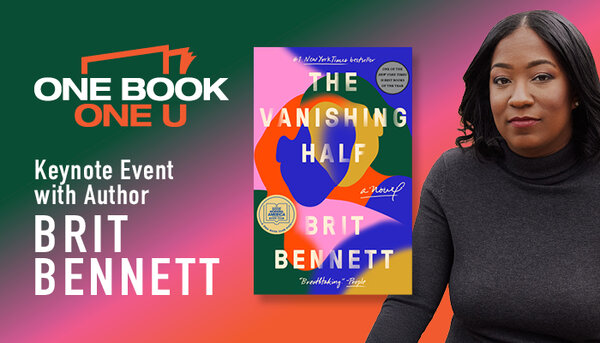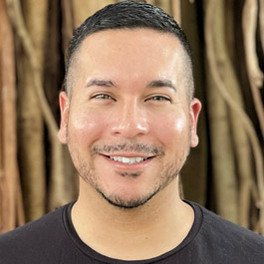Accessibility Options:
Selection for 2025-2026
“The Vanishing Half”
by Brit Bennett

The University of Miami's One Book, One U selection for 2025-2026 is Brit Bennett's “The Vanishing Half,” a New York Times #1 bestseller and “Good Morning America” June Book Club pick. This engrossing page-turner, longlisted for both the 2021 Andrew Carnegie Medals for Excellence in Fiction and the 2020 National Book Award for Fiction, explores the lasting influence of the past as it shapes a person’s decisions, desires, and expectations. In her talks and her work, she examines the role writing plays in documenting racial injustice and contemporary Black experience.
One Book, One U Common Reading Program
The One Book, One U program selects a book for each spring semester to provide a shared educational experience for our University community. Find information on upcoming events as well as research resources, dicussion guides, and more!

2020
Print, E-Book, and Audio Formats
If you are a member of the University of Miami community, use the links below to get access to the eBook:
If you are a member of the South Florida community, check your local library to find a copy of the ebook available for check out.
Contact Information
Find a copy of the book in a library!
If you are a member of the UM community, use the links below to get access to the eBook:
If you are a member of the South Florida community, check your local library to find a copy of the ebook available for check out.
Events
One Book One U Student Book Club
Meeting Dates: February 10th, 2026
Meeting Time: 6:00 PM
Virtual
Registration Information
PETAL Faculty Showcase
October 24, 2025
Trans Awareness Week: Speakeasy Night at the LGBTQ Center
Tuesday, November 18, 2025
LGBTQ Student Center | 6 - 8 PM
Save the Date: Keynote Event with author Brit Bennett
February 12, 2026
Doors Open: 6 PM Program: 6:30 PM
Registration Information
Search our databases for research based on themes in The Vanishing Half
UM Instructional Designers
Other Resources
Ask A Librarian!
Discussion Questions
Using the Chapter Summaries document, select a chapter that relates to your class or group and host a discussion session. As a starting point, you can use the questions below, adapted from the American Library Association Book Discussion Group online guide.
Questions to Discuss For Non-Fiction
- If your book is a cultural portrait --of life in another country, or different region of your own country--start with these questions first:
- What does the author celebrate or criticize in the culture? Consider family traditions, economic and political structures, the arts, language, food, religious beliefs.
- Does the author wish to preserve or reform the culture? If reform, what and how? Either way—by instigating change or by maintaining the status quo—what would be gained or what would be at risk?
- How does the culture differ from yours? What was most surprising, intriguing, difficult to understand? After reading the book, have you gained a new perspective—or did the book affirm your prior views?
- Does the book offer a central idea or premise? What are the problems or issues raised? Are they personal, spiritual, societal, global, political, economic, medical, scentific?
- Do the issues affect your life? How so—directly, on a daily basis, or more generally? Now or sometime in the future?
- What evidence does the author give to support the book's ideas? Does he/she use personal observations and assessments? Facts? Statistics? Opinions? Historical documents? Scientific research? Quotations from authorities?
- Is the evidence convincing? Is it relevant or logical? Does it come from authoritative sources? (Is the author an authority?) Is the evidence speculative...how speculative?
- Some authors make assertions, only to walk away from them—without offering explanations. It's maddening. Does the author use such unsupported claims?
- What kind of language does the author use? Is it objective and dispassionate? Or passionate and earnest? Is it polemical, inflammatory, sarcastic? Does the language help or undercut the author's premise?
- Does the author—or can you—draw implications for the future? Are there long- or short-term consequences to the problems or issues raised in the book? If so, are they positive or negative? Affirming or frightening?
- Does the author—or can you—offer solutions to the problems or issues raised in the book? Who would implement those solutions? How probable is success?
- Does the author make a call to action to readers—individually or collectively? Is that call realistic? Idealistic?Achievable? Would readers be able to affect the desired outcome?
- Are the book's issues controversial? How so? And who is aligned on which sides of the issues? Where do you fall in that line-up?
- Can you point to specific passages that struck you personally—as interesting, profound, silly or shallow, incomprehensible, illuminating?
- Did you learn something new reading this book? Did it broaden your perspective about a difficult personal issue? Or a societal issue? About another culture in another country... or about an ethnic / regional culture in your own country?
